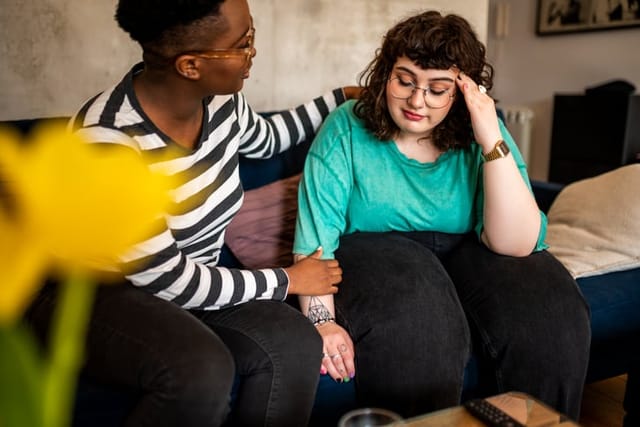It’s tough to say no, especially when you don’t want to disappoint someone (hello, people pleasers of the world!). However, at a certain point, you have to start setting some boundaries in your life. Constantly saying yes can leave you feeling overwhelmed and stressed out, and you already have enough of that in your life. If you struggle with being like, “Nah, I really can’t” (or even “I don’t want to”), here are some suggestions for learning how to say no without feeling guilty and letting it eat at you for the next million years.
1. Understand your limits.

You’re literally one person with the same 24 hours a day as everyone else (though your 24 hours may be a little more jam-packed and stressful than other people’s). That means you have finite resources with which to work and you can’t be everything to everyone or be everywhere at once. Accept that you’re not a superhero and that you can only realistically do so much. You’ll have to say no to some things by default. That’s just the way it goes.
2. Offer an alternative if you can (and want to).

Say someone invites you out for coffee and you’re super swamped with work, already have other plans, or really just want to go home and throw a frozen pizza in the oven and watch “Love Is Blind.” It’s not that you don’t want to hang with the person, you just can’t do it tonight. In that case, you might find it easier to say no by throwing in an alternative. Something like, “I can’t tonight, but how’s Friday for you?” can soften the blow for both you and them.
3. Remember what “yes” costs you.

This is perhaps the easiest way to get to grips with saying no. Think about the alternative. Sure, you could say “yes” to everything you don’t want to or can’t do, but what would that mean for you? Would it cause you extra stress, anxiety, exhaustion, time with people who matter to you? Sometimes considering the repercussions of the choices we make is the best way to guide ourselves to a different path. Just sayin’.
4. Be brief but assertive and honest.

You don’t have to give some long-winded explanation for why the answer is anything other than “yes.” It is what it is — and if the person is a grown adult who’s mature and has a modicum of intelligence, they’ll accept it and not push you for justification. Just be like, “Yeah, no, I can’t” and leave it at that. End of story. Trying to sugar-coat it or tiptoe around the fact that your final answer is anything other than “NOPE” is a waste of time and energy.
5. Practice with the little stuff.

If you struggle with being able to say no to the big stuff, try the small stuff first. Say no to working late one night or to a colleague asking if you want anything from the McDonald’s run at lunch. The more practice you get in, the easier that two-letter word will become for you (and the more you’ll realize it’s really no big deal).
6. Accept that it’s okay to prioritize yourself.

Part of the reason so many people struggle to say no is that they’re always putting other people’s needs first. You don’t want to disappoint them or let them down, so you overextend yourself and get roped into plans you really don’t want to (or don’t have time or energy to) be part of. Getting out of this pattern takes time and effort, but it also takes a strong belief that your own needs matter and that it’s okay to put those first sometimes.
7. If you’re unsure, don’t commit right away.

Maybe it’s not a definite “no” but you’re not really sure if it’s a “yes” yet either. In that case, buy yourself some time by saying something non-committal like, “Hm, I’m not sure if I can — let me check my schedule and I’ll let you know!” This gives you time to figure out how you’re really feeling and if this is something you want to do. Of course, if the request is time sensitive, you’ll need to be quick about it. Otherwise, don’t jump the gun!
8. Get some professional help if this is a serious struggle.

There’s nothing wrong with admitting that you need a little extra help in figuring out how to say no without feeling guilty about it (or saying it at all). That’s what licensed mental health professionals are there for. They can help you get to the root of the problem as well as give you tools and skills to be able to get a grip on the situation. With some hard work and some guidance, you’ll be turning people down in no time (in the best possible way).
9. Suggest someone else who might be able to help.

If someone asks you to do something you don’t have the bandwidth for but you know someone whose schedule might be a bit more open (or they might be a bit more willing), feel free to offer them up. For example, maybe you can’t pick up an extra shift at work but Shirley in marketing mentioned that she was looking for more hours. Suggest your boss ask her — you get the heat off yourself and do someone else a solid. Just don’t put anyone else in the spotlight if you’re not sure it’s okay with them.
10. Don’t leave room for misinterpretation.

When you say “no” to someone, make sure it’s clear that’s what you’re saying. Being wishy-washy or implying that you might change your mind down the line isn’t the way to go. When you’re turning someone or something down, it’s important to be firm about it and clear, as well. This way, they can’t come back and claim that you misled them on in any way.
11. Stick to your decision.

When you’re someone who regularly overcommits themselves or finds it hard to say “no,” you’ll probably find it tempting to switch that answer back to a “yes.” That’s because guilt sets in and you worry that you’re letting people down or disappointing them in some way. Well, so what if you are? “No” is a complete sentence and it needs to stay that way.
12. Pay attention to where “no” gets you.

This is a biggie. One of the easiest ways to let go of the guilt that comes with saying “no” is by paying close attention to the reaction it receives. For instance, say someone at work asks if you can handle an additional task even though you’re already spread way too thin. You tell them that sorry, but you don’t have the bandwidth. If they’re a decent person, chances are they’ll be like, “Ah, totally get it! I’ll ask someone else.” That’s it. The more you realize that saying “no” isn’t going to cause World War III, the easier it will become to do it.
13. Think of all the good it will bring into your life.

If there are big parts of your life that get put on the back burner because you’re constantly saying “yes” to everyone, think of how amazing it’ll be to see the total opposite. By saying no to going out drinking on Friday night, you’ll be opening up your weekend to a hangover-free fun, relaxing one. By saying no to staying late at work, you have a chance to grab dinner with your best friend. All the stuff you say no to leaves a lot more room for the “yes” that actually matters.
14. See how your confidence skyrockets.

It takes a lot of self-assurance to be able to say “no,” and the more you do it, the better you’ll feel about yourself. You’ll begin to feel strong, powerful, and capable of holding your own. That has a huge knock-on effect to how you carry yourself throughout your daily life and is extremely rewarding.
15. Don’t make it an emotional thing.

Saying “no” has nothing to do with your feelings or anyone else’s, and if they’re hurt or angry by being turned down, that’s for them to deal with. You’re only responsible for your actions, not other people’s reactions. Recognize that there are no personal feelings behind saying “no.” It just makes logical sense not to overextend yourself or spend your valuable time doing things you don’t want to do.
16. Refuse to justify or explain.

This is a biggie. You will want to justify, explain, and apologize for your decision to say “no,” but you don’t owe anyone that. You know that no one is ever going to care about you the way you care for yourself, so make sure you’re a priority in life — and never apologize for it.
Enjoy what you’ve read? Give us a like and follow Bolde on MSN for more!



